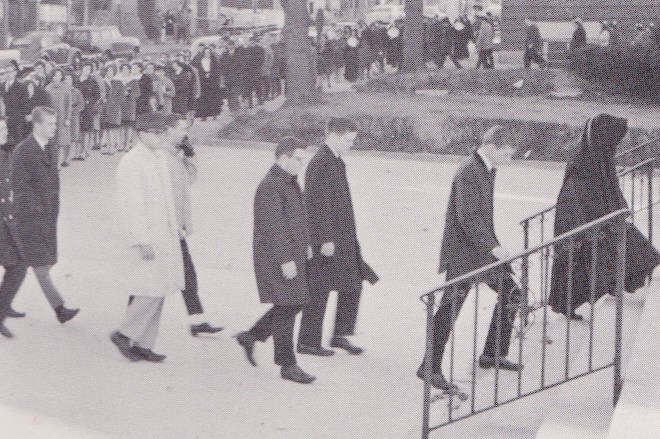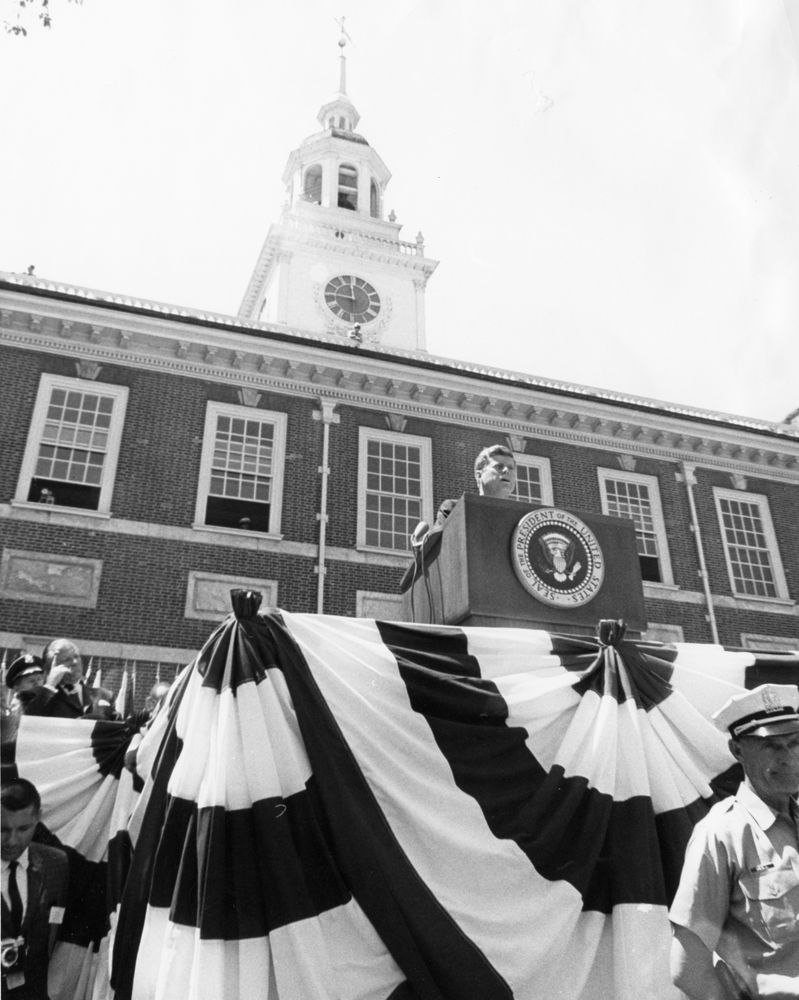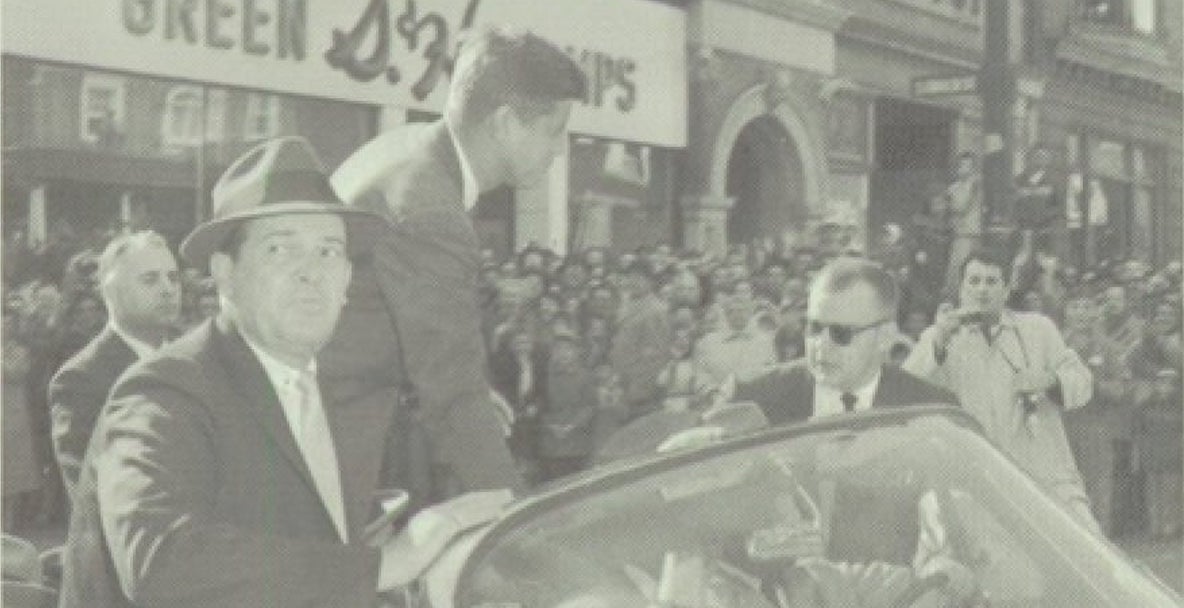Sixty autumns have passed since the assassination of John F. Kennedy that Friday, November 22, a day that traumatized a generation of children and revealed the impermanence of their innocence. For many, it was their first rendezvous with death. It endured as a vivid remembrance even as other memories lapsed with the passage of age. Many of those children are now grandparents, having lived past the average American life expectancy in 1963.
Others, like my father, are not here for the somber milestone. But until his own twilight, my father — like any Irish Catholic child of that period — remained haunted by that afternoon, transfixed by what Kennedy meant at that time, and committed to imparting those reminiscences unto his three sons.
Those memories — delivered as captivating litanies during holidays, car rides, and walks — were rooted in his place in time. He grew up on Hazleton’s South Side, then a culturally sequestered, hilltop city neighborhood in northeastern Pennsylvania. In that section, surrounded by a small urban mosaic of cultures and denominations, Irish Catholicism dictated the temporal lives of families whose grandfathers and great-grandfathers had labored in anthracite mines. St. Gabriel’s Church, in all its Gothic majesty, towered over the South Side’s blocks of half-double homes. His family’s own half-double on Birch Street faced St. Gabriel’s school — an imposing brick building, affixed with an elegant cupola — where, at age nine, he was seated that November afternoon inside a third-grade classroom.

At the time, amid the Cold War, my father and his parochial school contemporaries were conditioned to duck-and-cover drills beneath wooden desks and daily prayers for the conversion of Russia. There was an unspoken tension. Just a year before, on that last Sunday of October, his father — driving him home from his maternal grandparents in nearby McAdoo — abruptly pulled to the side of Buttonwood Street to hear the radio announcement that the Cuban Missile Crisis had ended.
One year later, though, neither father nor son were prepared for the trauma of that Friday, an unseasonably warm afternoon in a city accustomed to early autumn snow. When the Sisters of Mercy nun delivered the news, my father and his classmates — along with more than 900 other elementary, junior high, and high school students — exited the building. It was a spiritual evacuation, filled with shock and paralysis, into the ornate church, where they packed the pews beneath intimidating, suspended bronze lights. They prayed for Kennedy’s soul. They hoped it wasn’t the end of the world.
For my father, the past felt stale and distant. The magazines inside his childhood home — his parents were voracious readers of Look and Newsweek — were now dated and irrelevant. The cataclysmic event, moreover, overshadowed memories of three months before, when Hazleton garnered international attention. That August, three miners in Sheppton, a nearby “patch” town, were trapped 300 feet below ground. A massive, two-week drilling mission ensued, with the assistance of billionaire Howard Hughes, leading to the successful rescue of two miners on the day before the Rev. Martin Luther King’s I Have a Dream speech (“MINE MIRACLE,” read the Los Angeles Times’ front page banner headline; Kennedy had sent a congratulatory telegram).
But while Kennedy’s death relegated that event to another, faraway time, it also marked an unknowing, dark future ahead. That afternoon in St. Gabriel’s, seated near my father, were older boys who would become draftees and fight in Vietnam. (In 1966, the city would become newsworthy again when one wounded staff sergeant, native Harrison Bell, appeared on one of Life’s most famous magazine covers.)
Overall, in that moment, time was suspended. In the solemn days that followed, my father walked downtown with his father, an office furniture and supply salesman, to view the storefront tributes to the president. He was particularly moved by Fierro’s furniture store, where the front window displayed a lone rocking chair — Kennedy’s preference for chronic back pain — next to a table holding two hands clasped in prayer flanked by burning candles. And that Sunday, standing alongside his father at the Knights of Columbus, he watched Jack Ruby shoot and kill Kennedy’s assassin, Lee Harvey Oswald, on live television. The bar erupted in shock. That day, his father bought the Philadelphia Inquirer, which included a massive “In Memoriam” Kennedy portrait that my father kept and cherished.
Such vivid, precise memories exhibited the mind of an Irish youth who understood the deeper meaning of Kennedy’s murder. For it signaled the end of an innocent world and the beginning of an uncertain one. He witnessed that innocence firsthand during the 1960 campaign. He’d hear his mother and aunts comment on Kennedy’s handsomeness, while his father and uncles — all World War II combat veterans — commended his military service. All those years later, he could recite Frank Sinatra’s High Hopes, the lyrics changed for a campaign jingle. Everyone is voting for Jack. ‘Cause he’s got what all the rest lack.
My father also comprehended the deeper cultural meaning in a city of Catholic voters. That late October in 1960, Kennedy spoke before 12,000 in downtown Hazleton, an afternoon described by Pierre Salinger, the president’s press secretary, as “the wildest day of the campaign.” My father, then six, walked with his mother to Broad Street, where she lifted him above her shoulders to watch the candidate speak at a rostrum in front of the Altamont Hotel.

Less than two weeks later, on Election Day, my father walked with his father to the polling station. It was a march toward cultural enfranchisement. After all, in 1928, when Al Smith was the first Catholic to be nominated for president by a major political party, my great-grandfather Patrick — a miner with a first-grade education — took his 13-year-old son to witness burning crosses in the nearby Conyngham Valley, where Protestants protested Smith’s candidacy. My grandfather carried this enduring memory. And so, on that day in 1960, he defied the poll workers and brought my father into the voting booth to pull the lever for Kennedy. “He’s going to vote for the first Irish Catholic president,” he told the workers.
For a lifetime, my father was left with those fragments of an irretrievable past, one he often shared — “it could make me cry,” he’d say — at the dining room table on Thanksgiving. Now, in my apartment, I look at a bookcase — adorned with a framed photo of Kennedy standing in a convertible in downtown Hazleton — filled with books about the late president. Many were given as gifts by my father. In the one biography, he inscribed: “As a true believer in luck … this book will reinforce all that we (Irish) believe in. Remember, good luck is usually stalked by bad luck. So, why isn’t the opposite true? May you always remain on the bright side of the moon.”
Words written by one who understood, as Daniel Patrick Moynihan said that Sunday after the death of John F. Kennedy, “that the world is going to break your heart.”
Charles F. McElwee is the editor of RealClearPennsylvania. Follow him on Twitter at @CFMcElwee.
The Citizen welcomes guest commentary from community members who represent that it is their own work and their own opinion based on true facts that they know firsthand.
![]()
MORE HEROES WE MOURN




